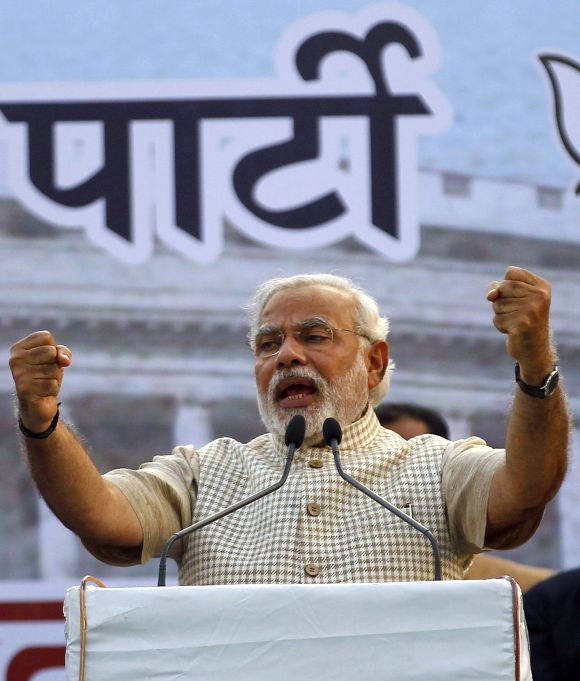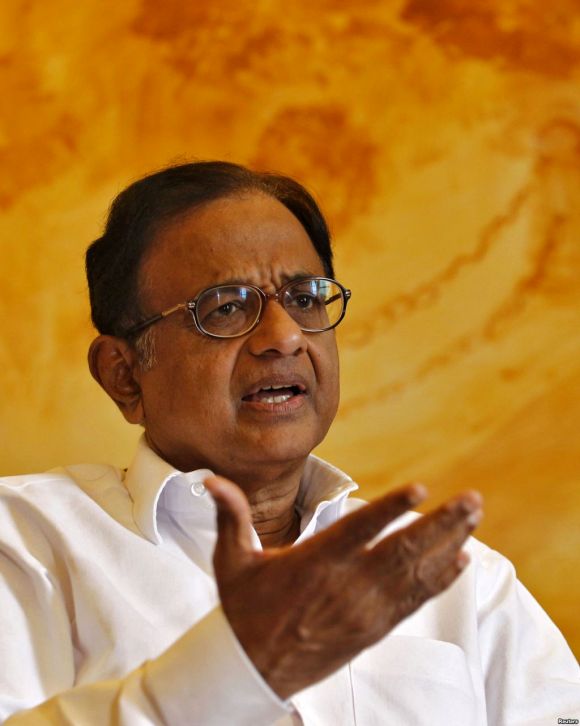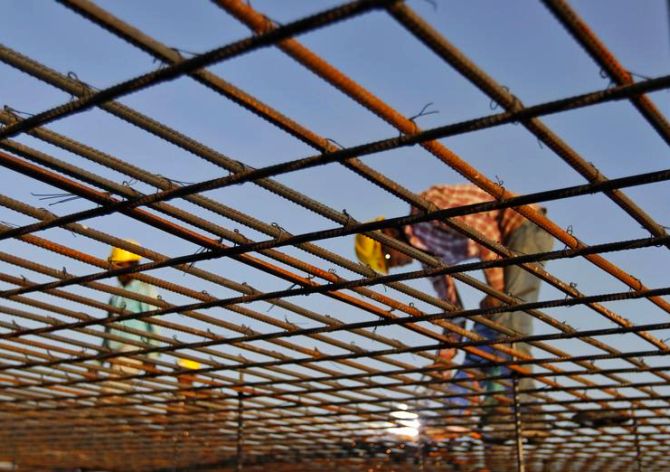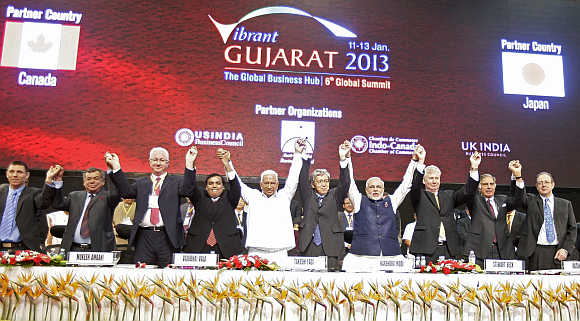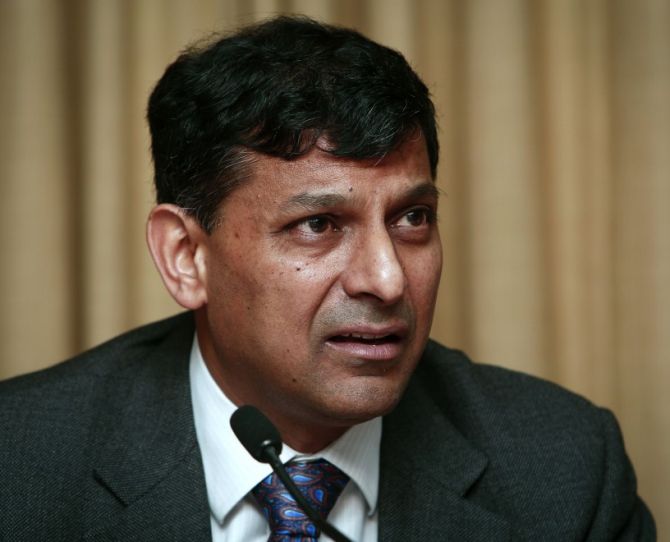 | « Back to article | Print this article |
Can Modi deliver all that he promised?
Will RBI Governor Raghuram Rajan stay or go? Will the new Prime Minister bring in foreign investment at the cost of upsetting his own party men? Many such important questions remain before the new government assumes office.
“Yesterday, India had no government. Now it has no opposition.” That message, which was doing the rounds on Friday, pretty much summed up the election.
After a gap of 30 years, a new Prime Minister takes charge backed by majority support.
This gives Mr Modi the leeway to appoint exactly the Cabinet he wants and to take decisive action without consulting allies.
He has to use the mandate to speed up the movement of files, to cut red tape, and also, to put together a framework for Reforms 3.0. His track record in Gujarat suggests that he will hit the ground running.
But the complexities of central administration are considerably more than those involved in managing a single state. He will have to delegate a lot and much will depend on the composition of the Cabinet.
Rumours are already rife about likely appointees and about the possible abolition and reorganisation of sundry ministries.
Click NEXT to read more…
Can Modi deliver all that he promised?
Lutyens' Delhi and Dalal Street, not to mention Wall Street and the City, are all going to be compiling dossiers on this yet-to-be-appointed set of individuals.
Their personal foibles, political equations and corporate connections will come under the microscope.
Don't be surprised if you see share prices hitting upper circuits on the basis of casual remarks to the effect that industrialist "X" was seen having coffee with Cabinet Minister "Y".
Once a cabinet is in place, the strategic direction of the budget will come into focus. This would be the new government's free shot at coming clean about the state of public finances.
The outgoing finance minister, Mr Chidambaram, has a certain reputation for skilful accounting and also for optimistic estimates, and it would be interesting to see how much the new estimates vary from the old ones.
It will also be interesting to see if the Bharatiya Janata Party (BJP) decides to go along with the change of emphasis in central funding outlined in the interim Budget of February 2014.
Click NEXT to read more…
Can Modi deliver all that he promised?
In essence, the February Budget allocated the lion's share of funding to states and cut central ministry expenditure drastically.
Will Mr Modi allow various central ministries to turn into nodal funding agencies? It doesn't gel with his personal style.
There are multiple areas where the new government must live up to high expectations.
For one, it has to find ways to reboot stalled infrastructure. There are multiple projects - in roads, power plants, railway lines, ports, airports, mining - stuck in limbo and massive amounts of capital are deployed unproductively as a result of this.
A few reasons are cited over and over again for the logjam. One reason is land acquisition issues, another is tardy environmental clearances, a third is contractual or other legal disputes.
The new government has to find ways to mitigate these problems. That could require a mix of legislative reform, redrafting of model contracts, the deft management of Centre-State relations and faster decision-making in terms of clearances.
Click NEXT to read more…
Can Modi deliver all that he promised?
Centre-State relation brings us to another priority area, namely the Goods and Services Tax (GST). Some version of GST must be implemented as soon as possible.
Assuming the Rajya Sabha co-operates, the BJP can put together the numbers to push this through, but it must also talk various states into coming on board.
In more ticklish areas, Modi would need a lot of courage to even attempt change.
Labour reform, or a review of the food procurement chain, are both sadly, not likely to be on the cards.
There are too many vested interests within the BJP itself, which want to maintain status quo in these areas.
The BJP's ability to build bridges abroad will also be crucial to attracting capital.
Given his own instincts, Modi would probably try to scale up Vibrant Gujarat into Vibrant Bharat but the easing of foreign direct investment (FDI) regulations could also run into entrenched opposition from the Swadeshi lobby.
Yet if FDI is not allowed into more sectors (and not just retail), and if there are no labour reforms, it is difficult to envisage the creation of the millions of new jobs that are required.
Click NEXT to read more…
Can Modi deliver all that he promised?
There are also subsidies and entitlements to be considered. The BJP voted for the new entitlements of the food security Bill when it was in opposition. It is unlikely to bite the bullet on MNREGA, or on fertiliser subsidies either.
What will it do with gas pricing, or with the rationalisation of retail price controls on diesel and kerosene? These all have direct correlations with the fiscal deficit.
The latest inflation data in conjunction with the Index of Industrial Production (IIP) make it clear that the economy isn't out of the woods.
The Consumer Price Index ran higher at 8.6 per cent in April, even though the Wholesale Price Index has dropped to 5.2 per cent.
This makes a policy rate cut unlikely and the Reserve Bank of India will certainly not loosen up before the budget. The IIP also showed a marginal contraction of -0.1 per cent in March.
Click NEXT to read more…
Can Modi deliver all that he promised?
While most institutions have hailed the election results as a positive outcome, nobody can expect rapid acceleration in gross domestic product growth, given those numbers.
And yes, Mr Modi will have to get along with Dr Rajan if monetary policy is to mesh harmoniously with fiscal policy.
Thus far, the foreign institutional investors have been the most enthusiastic financial backers for the Modi wave and there's every reason to assume they will continue to be overweight on Indian equity.
If domestic institutional investors (net sellers till last week) decide to get bullish, the stock market could head into the stratosphere.
The Nifty has gained about 18 per cent in the last 12 months and it could easily gain another 10-15 per cent if the budget appears sensible.
And don't forget the aam aadmi. There has been a euphoric revival of retail sentiment. This could in itself, lead to a spike in consumption demand.
